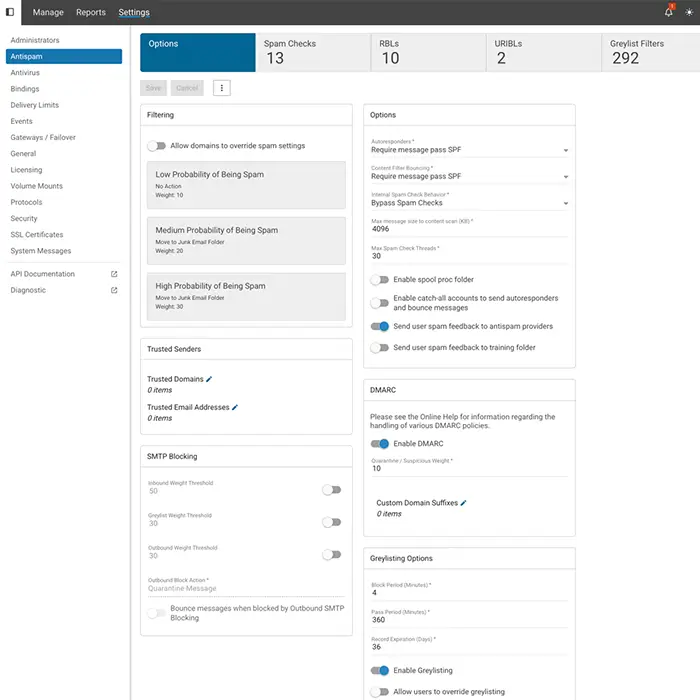Advanced Antispam, Antivirus, and Email Security
Structured, multi-layered protection is included with SpamAssassin and Rspamd. Customized spam filtering with industry-standard methods such as greylisting, SPF, DKIM, DMARC and more, ensure advanced security for Linux and Windows mail servers. Built-in antivirus guards against malware, phishing attempts, and other cyber threats. Security features include intrusion detection, DoS protection, and more, providing robust email security regardless of your operating system.


Included Anti-spam
With the anti-spam tools included with every SmarterMail license, email administrators can achieve immediate spam prevention simply by managing:
- SpamAssassin-based Pattern Matching
- Rspamd support - including support for remote Rspamd servers
- Pre-configured URIBLs and RBLs, by default
- The ability to add custom URIBLs and RBLs
- Greylisting, DMARC, DKIM and SPF
- SmarterMail is flexible enough to allow for additional third-party products, services, or anti-spam/security appliances.

Message Sniffer
Message Sniffer from ARM Research Labs uses advanced pattern detection and collaborative learning technologies to accurately identify spam, scams, viruses, and other email borne malware before it hits inboxes. It is compatible with both Linux and Windows platforms.

Consistent Rulesets
For system administrators who manage multiple mail servers, it's possible to configure anti-spam options on one server, then export those rules and import them into another SmarterMail server on the network. This allows for a robust, consistent set of anti-spam options on every mail server.

Server Management
System administrators can elect to lock down the server as a whole, and implement their own robust anti-spam policies, or allow domain administrators to manage anti-spam options. And if they want, domain administrators can even let their users manage what they want done to low, medium and high probability messages.

Anti-spam Management
Using SmarterMail's web interface, system administrators can access all security features using their favorite web browser. In addition, all anti-spam settings are contained in a single JSON file, so system admins can easily transfer anti-spam settings so that all SmarterMail servers are consistently managed and consistently secured.
Anti-spam from Cyren by Data443
Increase your anti-spam protection using RPD technology and IP Reputation from Cyren by Data443:
- Cyren Premium Anti-spam. Using their Recurrent Pattern Detection (RPD) it's possible to dramatically increase the efficiency of spam protection while offloading the CPU cycles to Cyren's servers.
- Cyren IP Reputation. Cyren's global system identifies and tracks IP addresses and ranks them according their potential for malicious behavior. IP Reputation is included with the Cyren Premium Anti-spam add-on, so there's no additional licensing.
- Cyren by Data443. Offers protection against phishing and malware, attachment analysis, advanced threat intelligence, real time blocking, and more for both inbound and outbound messages. See Cyren by Data443's competitive analysis PDF.


Enterprise Level Anti-virus
SmarterMail features effective, self-updating virus protection through ClamAV, included with every installation, ensuring secure server operation. SmarterMail also utilizes Microsoft Defender Anti-virus for enhanced security. Administrators can integrate third-party anti-virus solutions via command-line execution, providing an efficient option for high-volume mail environments and alleviating server load. ClamAV Anti-Virus detects malware, viruses, worms, and other threats, and is part of the SmarterMail package for Linux.
Anti-virus from Cyren by Data443
Cyren Zero-hour Outbreak Detection is a complementary service to help identify "zero hour", or recently released, viruses and malware. It does this by identifying unusual behaviors or anomalies in data flows that could indicate a malware attack. It monitors and analyzes the volume and frequency of attachments sent through mail traffic, identifying potential outbreaks based on the sheer scale and speed of distribution, which is typical of many worm or mass-mailing virus and malware attacks. Read more in Cyren by Data443 Zero Hour datasheet.
Administrators can also use any other anti-virus protection, either installed on the server, in the cloud or even via command line.


Advanced Security Features in SmarterMail
SmarterMail provides a secure, business-class email server with built-in protection against spam, phishing attacks, and unauthorized access. SmarterMail provides enterprise-grade security for Linux and Windows email servers, ensuring your organization’s communications remain safe from evolving cyber threats.
Key security features include:
- Password Policy Enforcement
- Two-Step Authentication
- Intrusion Detection System (IDS)
- IP-Based Access Restrictions
- Email Harvest Attack Detection
- Denial of Service (DoS) Protection
- Brute Force Attack Prevention
- Automated Security Events